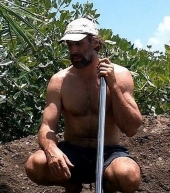posted 10 years ago
When you say you "do twenty miles" do you mean running? Hiking? Cycling? Elliptical at the gym? Rowing?
Very broadly speaking, cardio exercise tends to demand more carbs, and strength exercise tends to demand more protein for muscle recovery. Exercise at a lower heart rate tends to burn fat instead of carbs.
Since you do landscaping work as well as what I presume is cardio, and because you are a human being and meant to eat a somewhat varied and balanced diet, I would definitely make sure to get sufficient fat and protein as well as carbs. This can be meat, fish, poultry, eggs and dairy, or if you are vegan some combination of relatively high-protein plants such as legumes + healthy fats such as avocado, olive oil, nuts, etc.
I would certainly not avoid carbs, since most people, especially women, find long-term endurance exercise on a low-carb diet to be rather disastrous, but I wouldn't center my diet around carbs alone, either. People can sustain high levels of exercise on very varied diets, and just because you are active does not mean you should eschew balance in your diet. I would try to get most of my carbs in the form of fresh fruits and vegetables and starchy tubers such as potatoes and sweet potatoes, plus legumes and whole grains if you like (some people are more sensitive to legumes and/or grains, and don't feel well when eating them, so you might experiment with that), not from, say, large helpings of pasta, rice, and bread, much less candy and sports drinks, which will probably make you feel crummy. I'd also make sure to eat your carbs together with some protein and fat, not just generally but within the same meal (fat with your carbs changes the speed at which the sugars are broken down and enter your bloodstream and your cells). Less processed versions of carbs hit your system less hard and tend to cause fewer symptoms, so for instance someone who feels ill after a fruit smoothie might feel fine after eating the equivalent amount of whole fruit.
Hydration and electrolyte balance is also a consideration, so of course drink plenty of water and don't skimp too much on your salt intake.
Intense aerobic activity every day with no rest over the long term can cause issues with overtraining, such as adrenal fatigue, increased risk of injury, amenorrhea in some women, especially those with low body fat levels, and other issues, so do keep a good eye on your health. You also might want to consider swapping some of your cardio for strength work, depending on how demanding the landscaping you do is, or switch some of your high-intensity cardio for less intense stuff such as hiking/backpacking, which will shift you more toward fat-burning instead of carb-burning, or a more full-body exercise such as rowing, which will also promote muscle strength and make injury less likely.










